Simulated Interviews: 16/02/2022
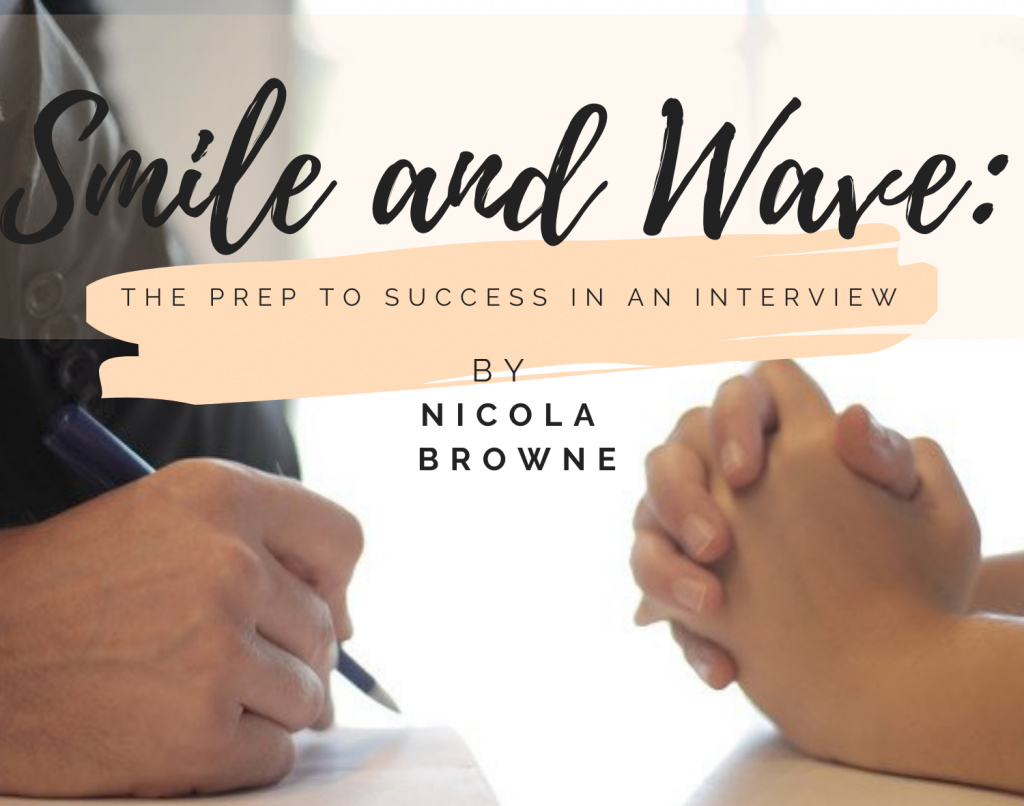
We know the old saying of failure to prepare, prepare to fail. You can apply for a job that you’re qualified for, suited to, and have passion for; but, without preparation, you will never get past the meeting room. This is exactly what I learned the hard way during my simulated interview.
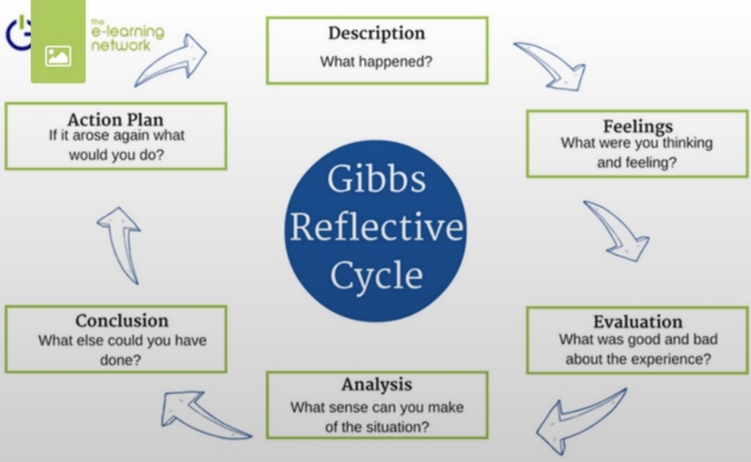
Through Gibbs’ reflective cycle, I will comment on my experience of week three’s simulated interviews and what I have learned for future job interviews.
Fig.1: Gibb’s Reflective Cycle.
Rumson, Ruby. ‘Gibbs – Reflective Cycle Model (1988)’, The E-Learning Network, 2018.
Where to begin? – a career in TV development
My placement studies with television production company Strident Media have given me the opportunity to work and engage with their Development Team on some of the company’s current projects. This experience has built both my confidence and interest in television development through researching, brainstorming, and pitching to commissioners.
Therefore, I decided to apply for a Development Producer role within the BBC, a role which I envisage myself working towards after graduation.
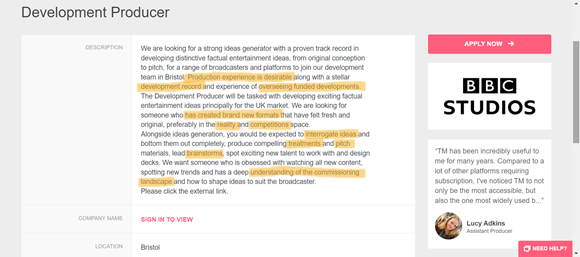
Fig.2: Development Producer job description
Interview prep – it’s simple: just be the best
In what one could argue served as research for this interview process, watching The Apprentice (the series that is essentially a 14 week-long job interview) offered me much insight regarding how to conduct yourself in a professional capacity. The series highlights the importance of initiative, organisation, and preparation in order to be a successful candidate, which I reflected on for my own future performance in an interview.
The interview process is the first opportunity to ‘“sell” your superior experiences and interpersonal qualities to interviewers.’ (Muir 156). Therefore, I knew that preparation was critical to any candidate’s success, as it is the ‘key to presenting yourself well during an interview’ (Mooney 42). Analysing the company’s job description (see fig.2), I recognised essential and desirable criteria which the company had outlined and were likely to discuss during an interview.
The girl that has it all – experience, personality, organisation
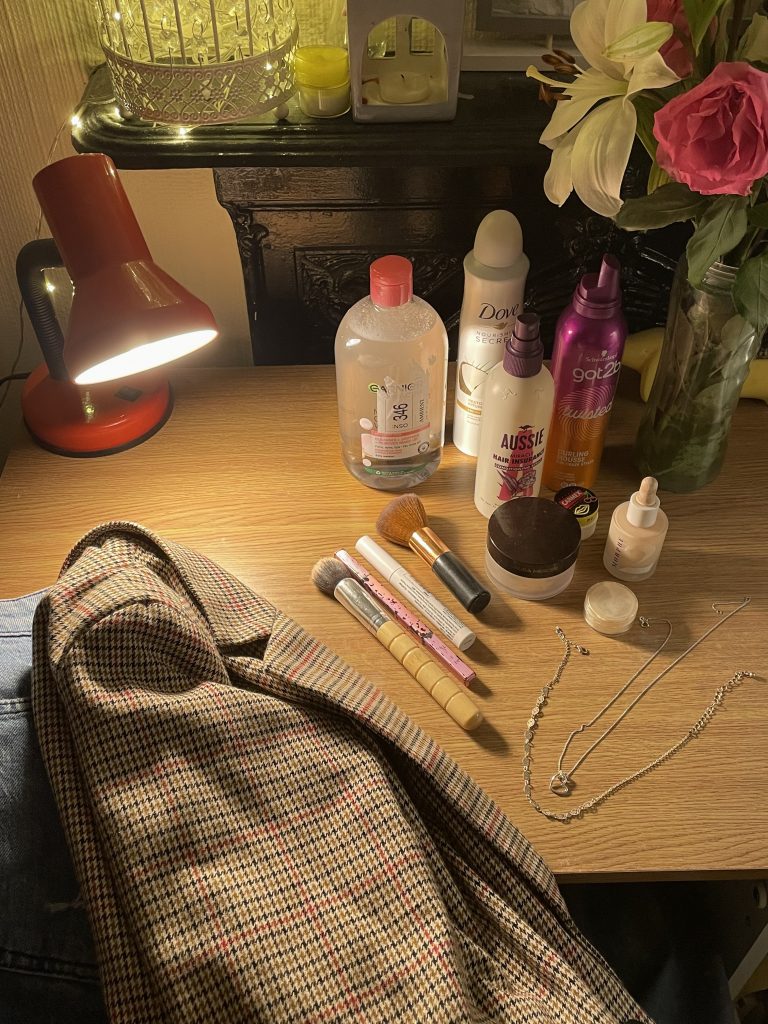
Whilst I took time to simulate answers related to my studies, my experience, and technical skills, I understood that there was more to securing a successful interview than the ability to showcase professional experience. As Edwards comments, ‘Attention to your personal appearance is important’ (28).
Relating to this, I ensured to take time to plan my physical appearance for the interview, as well as polish my performance in a professional capacity.The night before my simulated interview, I took time to plan my hairstyle, outfit, and all of my products (see fig. 3). With this, I felt I was prepared for the morning to come.
Fig. 3: My clothes and products laid out the night before my interview
However, I was in fact not prepared for the morning to come.
Like Edwards, Mooney too insists that ‘The first impression anyone has about you is based, of course, on the way you look- your clothing, your expression, how well organized you are.’ (42). With this, the idea of turning up to an interview with both an untidy appearance and disorganised nature would certainly prove unfavourable to your performance as a candidate. This is unfortunately exactly what happened to me prior to my interview.
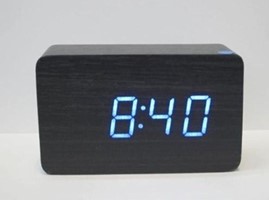
The next morning, after opening my heavy eyelids and seeing my clock smugly inform me that it was 8:40am, I jumped up and exclaimed to no one in particular; “I SLEPT IN!”.
Not a good start to the day.
Here is where I examine my interview experience using Gibbs’ reflective cycle.
Reality hits – what happened?
Sleeping in just twenty minutes before my interview was to start, I rushed around the house trying to do the bare minimum in regards to my appearance in order to look socially acceptable in an interview whilst not leaving myself late. My product collection was discarded, as was any confidence I’d built up around it.
Due to this timely mishap, I disregarded one of the key pointers for an interviewee: ‘Arrive early – at least five to ten minutes’ (Edwards 28). Instead, I chose to arrive five to ten minutes late.
Get the dishevelled look – what was I thinking and feeling?
I ran out of the house feeling anxious and disorganised, which was not ideal considering I was going to be trying to persuade three interviewers why I was the perfect employee for their company in less than ten minutes.
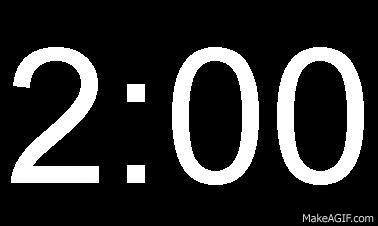
Baptiste insists that ‘Being late for an interview is not going to create a good impression’ (120), which I knew left me at a disadvantage going into my interview. Arriving feeling a rush of adrenaline, anxiety, and slight embarrassment, I knew that all my preparation was about to go out of the window, as all I could think about was whether my hair was sticking up or not.
Instead, I chose to think on the spot and use my social skills to get me out of my sticky situation.
It’s show time! – what was good and bad about the experience?
Whilst I understood that sleeping in negatively affected how I presented my physical appearance as well as my sense of time management and organisation, I was able to over-compensate in other ways. Thus, I learned the importance of positive social engagement in an interview environment.
Muir credits this idea, describing a study which compared social intelligence and professional experience in candidates, and found that interviewees who were ‘pleasant, agreeable, and offering compliments to interviewers were deemed better fits to their prospective jobs (and were hired at a higher rate) than applicants who focused more on their credentials for the job’ (156).
With the encouragement of my group, I was able to engage with my interviewees socially and develop a positive relationship with them in the short period that I was being interviewed. This alone I felt created a positive impression of myself as a candidate, regardless of my appearance or professional experience.
Conclusion – future target action
Whilst my poor organisation skills (and fatigue) negatively impacted my performance in my simulated interviews, the experience was extremely useful for me in learning a more comprehensive view of all of the qualities which contribute to a successful candidate.
Whilst I may have understood the importance of company research, preparation, and physical appearance, I had not held much thought on the importance of positive social engagement in order to make yourself a stand-out candidate.
In future however, I will ensure to set my alarm and get a good night’s sleep the night before my interview.
Works Cited
Baptiste, Mark. How to Get a Job in Television: The Ultimate Guide to a Career in TV Playout, Transmission & Master Control. Createspace Independent Publishing Platform, 2017.
Edwards, Joyce. “Taking a Job Interview.” NACTA Journal, vol.29, no.3, 1985, pp. 27–29.
Mooney, Patricia. “The Job Interview.” Umoja Sasa, vol.6, no.5, 1982, pp. 42–44.
Muir, Clive. “Managing the Initial Job Interview: Smile, Schmooze, and Get Hired?” The Academy of Management Executive, vol.19, no.1, 2005, pp. 156–58.
You May Also Like
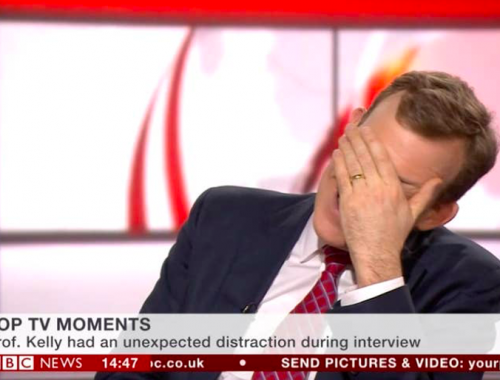
When the BBC thinks you live in the Atlantic – My Simulated Interview
17 February 2022
Finding the Right Balance: My Simulated Interview Experience
14 February 2022
